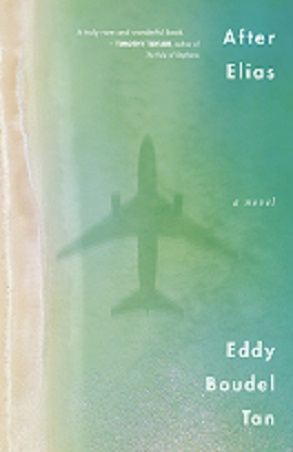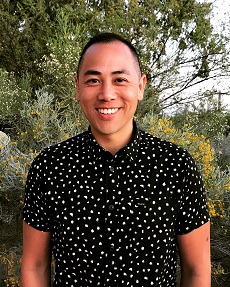I’ve always believed that character is formed through adversity. I put Coen in this devastating situation to see how he attempts to overcome it, and what he learns about himself along the way.
Eddy Boudel Tan – 12 September 2020
The Back Flap
When the airplane piloted by Elias Santos crashes one week before their wedding day, Coen Caraway loses the man he loves and the illusion of happiness he has worked so hard to create. The only thing left behind by Elias is a recording of his final words, and even Coen is baffled by the cryptic message.
Numb with grief, he takes refuge on the Mexican island that was meant to host their wedding. But as fragments of the past come to the surface in the aftermath of the tragedy, Coen is forced to question everything he thought he knew about Elias and their life together. Beneath his flawed memory lies the truth about Elias — and himself.
From the damp concrete of Vancouver to the spoiled shores of Mexico, After Elias weaves the past with the present to tell a story of doubt, regret, and the fear of losing everything.
About the book
What is the book about?
After Elias is the story of a pilot’s last words before he flies an airplane into the sea one week before his wedding day. It follows the fiancé left behind as he tries to make sense of his tragic new reality. Ultimately, though, it reveals what happens when we lose everything we’ve built and can no longer hide behind the illusions we create.
When did you start writing the book?
January 2017, only a few days into the year.
How long did it take you to write it?
I completed the first draft in roughly six months, but it took another few months of revisions before the manuscript was ready to submit to literary agents.
Where did you get the idea from?
This may sound morbid, but I wanted to create a person with a seemingly perfect life, then take it all away from him. Thus, Coen Caraway, the pilot’s fiancé, was born. The story follows him in the aftermath of the plane crash in which he loses Elias. He refuses to cancel the wedding or leave the Mexican island where it was meant to be held, insisting that it be a celebration of Elias’s life instead. But as memories come to the surface and media speculation intensifies around the possibility that the crash might not have been an accident, Coen learns that the truth about his perfect life is far more complicated than it once appeared. I’ve always believed that character is formed through adversity. I put Coen in this devastating situation to see how he attempts to overcome it, and what he learns about himself along the way.
Were there any parts of the book where you struggled?
The first chapter! Always, without fail, that first chapter is the toughest part of writing a novel—not only writing it in such a way that it holds the reader’s attention, but deciding the right scene and point in the story to begin. Both the decision and execution are critical. I rewrote the first chapter of After Elias at least twenty times.
What came easily?
Coen’s voice. Though he and I are different people in many ways, I knew him intimately as I told his story through his eyes. I understood his fears, his motivations, and how he saw the world.
The second half of the story also came very naturally. I knew the general thrust of the plot at the beginning of the process, but I didn’t map out how the story would get from point A to point Z. Rather, I wanted to trust my instincts and discover where the story took me. There were some surprises along the way, which were thrilling, and the second half was driven mostly by instinct and curiosity.
Are your characters entirely fictitious or have you borrowed from real world people you know?
They’re all creations of my imagination, but I can see pieces of myself and people I know in them.
Do you have a target reader?
I think the novel might be of special interest to the LGBTQ+ community, as it centres on a young gay couple, but the cast is diverse, spanning different spectrums of race and class, and the themes of doubt, regret, guilt, and healing are universal.
About Writing
Do you have a writing process? If so can you please describe it?
I typically start with a character that is put in an extraordinary situation, and from there I form the setting, the conflicts, and the arc of the story.
Do you outline? If so, do you do so extensively or just chapter headings and a couple of sentences?
I like to outline the essential beats of the plot, while leaving white space in between to allow the story to tell itself.
Do you edit as you go or wait until you’ve finished?
I edit as I go, usually revising the previous chapter before attempting to write the next. It helps to keep me immersed in the continuity of the story and identify potential problems that could snowball if left unchecked.
Did you hire a professional editor?
Since my agent provides editorial feedback (not all agents do), and my first two novels are being published by a well-established indie press, I entrust them with the editing. That said, I did hire a freelance editor to review an early version of my second novel because I wanted their input before sharing it with my agent, and it was time and money well spent.
Do you listen to music while you write? If yes, what gets the fingers tapping?
No. I need near-complete silence while writing, but I do listen to music to fire myself up beforehand. Each of my novels has a soundtrack of sorts, of songs I associate with the story. For After Elias, I listened to the Battle Born album from The Killers and the Conscious album from Broods.
About Publishing
Did you submit your work to Agents?
Yes, I’m represented by Jessica Faust of BookEnds. She’s a fabulous agent who provides heaps of free, transparent advice for writers through her blog, social media channels, and YouTube videos.
What made you decide to go Indie, whether self-publishing or with an indie publisher? Was it a particular event or a gradual process?
I’ve always been very independent in spirit. Supporting local, independent business is something I’m very passionate about. My agent submitted After Elias to a combination of big and small publishing houses. It came down to finding the right editor and team who felt as strongly about the book as we did, and I’m so grateful we found that in Dundurn, an independent publisher based in Toronto.
Did you get your book cover professionally done or did you do it yourself?
My cover was designed by the talented Sophie Paas-Lang, Dundurn’s in-house designer.
Do you have a marketing plan for the book or are you just winging it?
Dundurn has a fully staffed marketing and publicity team leading the charge, but I’ve also been hustling myself to secure interviews and posts through my network. I have many years of experience in the advertising industry, so this comes naturally to me.
Any advice that you would like to give to other newbies considering becoming Indie authors?
First and foremost, focus on honing your craft and writing an exceptional story, both in concept and execution. Ensure you solicit and consider feedback from beta readers, and consider hiring a professional editor if you don’t have the support of an editorial agent or publisher—it takes a team to create a good book, and they’ll be able to spot issues you might be blind to. With the advent of many new options to publish, including self-publishing, the market is more crowded than ever. Though this creates wonderful new opportunities for authors, it’s also much harder now to find an audience and stand out from the pack.
About You
Where did you grow up?
Beautiful Vancouver, on the west coast of British Columbia.
Where do you live now?
I never left! I still live in Vancouver, in the West End neighbourhood minutes from the ocean.
What would you like readers to know about you?
Apart from being a writer, I’m also cofounder of the Sidewalk Supper Project, a community initiative that serves home-cooked meals to those living on the streets of Vancouver. Everyone has a different story, born from different circumstances and support systems (or lack thereof). I believe in empathy, compassion, and the importance of being kind to one another.
What are you working on now?
My second novel, The Rebellious Tide, is slated for publication with Dundurn in 2021, so I’ve been busy with edits. I’m excited to share these two novels with the world, but I’m also eager to begin writing the next book, which I hope will happen soon!
End of Interview:
For more from Eddy, visit his website, follow him on Twitter, and like his Facebook page.
There are several options for getting your copy of After Elias. Paper copies can be purchased in the US from Bookshop, in Canada from Chapters Indigo, or elsewhere from the Book Depository. If you’re looking for a Kindle ebook try Amazon US or Amazon UK.


